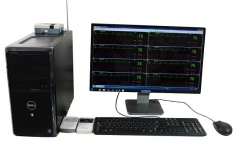Wechat QR code

TEL:400-654-1200

TEL:400-654-1200
Methods and clinical significance of 24 - hour dynamic blood pressure monitoring
Dynamic blood pressure can be a comprehensive and detailed observation of the dynamic changes in blood pressure throughout the day. It has a good correlation with hypertension complications and is helpful for rational antihypertensive therapy, efficacy evaluation and prognosis judgment. The application of dynamic blood pressure monitoring has brought the study, clinical diagnosis, treatment and prognosis evaluation of hypertension into a new stage.Meilun

I. methods of dynamic blood pressure monitoring:
1. Direct method (invasive) : a catheter was inserted into the brachial artery, and a portable micropump was used to continuously input heparin normal saline.Meilun
2 indirect method (no damage) : (1) the upper arm cuff gap automatically inflated pressure, and then pick up the pressure wave signal in the air bag. This method is used by the court. (2) fingertip dynamic blood pressure recorder: a pressure sensor is installed on the fingertip to measure the arterial blood pressure of the left index finger. But finger movements can lead to large errors.
Significance of dynamic blood pressure monitoring
Dynamic blood pressure monitoring is helpful to distinguish between angina pectoris and arrhythmia caused by decreased or elevated blood pressure. If st-segment depression occurs after elevated blood pressure, it suggests that increased ventricular wall stress caused by elevated blood pressure is the main cause of myocardial ischemia. Synchronous observation often shows that the number of ventricular premature beats in patients with hypertension is positively correlated with systolic and diastolic blood pressure levels.
Iii. Guide the antihypertensive therapy and evaluate the efficacy of drugs
(1) the antihypertensive effect should not only observe the blood pressure measured along with the blood pressure, but also understand the mean blood pressure value of 24 hours, the maximum and minimum blood pressure value, and the blood pressure value of isobaric and isobaric exercise.
(2) if ABPM confirms that certain refractory hypertension is a large fluctuation of systolic blood pressure, it can be controlled by slowing heart rate.
(3) all kinds of antihypertensive drugs have different effects on blood pressure during the day and night. When choosing antihypertensive drugs, we should refer to blood pressure circadian rhythm, especially for those whose blood pressure circadian rhythm disappeared, we should try to restore normal blood pressure circadian rhythm, which is helpful to prevent the occurrence of complications. The goal of antihypertensive therapy is to reduce blood pressure to "normal or ideal levels" while restoring the disturbed circadian rhythm of blood pressure. ABPM helps in the selection of antihypertensive drugs. The observation and study by ABPM method showed that angiotensin-converting enzyme inhibitor (ACEI) drugs were suitable for the treatment of hypertension patients with continuously elevated blood pressure within 24 hours, so as to reduce blood pressure steadily within 24 hours. Patients with arytenoid should not be used to avoid exacerbating nocturnal hypotension. Blockers do not significantly decrease blood pressure at night, and are suitable for patients with "arytenoid" hypertension. Diuretics and calcium antagonists had no significant effect on blood pressure rhythm. These characteristics are helpful to clinical rational drug use.
(4) according to the peak and trough time of blood pressure indicated by ABPM, antihypertensive drugs with different action duration may be more effective in controlling blood pressure and reducing adverse drug reactions.